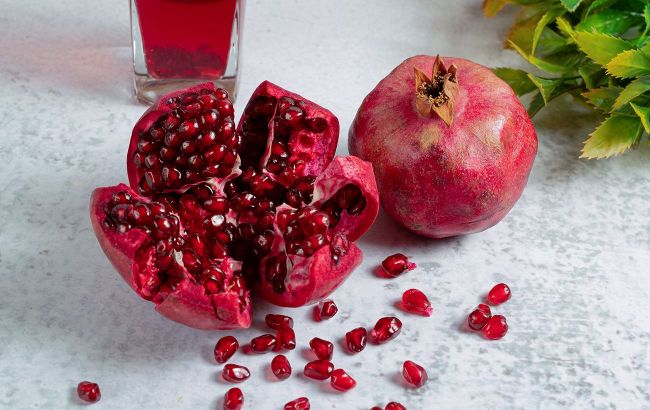Pomegranate: Eating it right and who should avoid it
 Pomegranate - useful fruit, but not for everyone (photo: freepik.com)
Pomegranate - useful fruit, but not for everyone (photo: freepik.com)
How to eat pomegranate in the right way and whether its seeds can harm the body is a question that interests many. At the same time, some people prefer not to eat pomegranate at all, or significantly limit its presence in the diet.
The following sources were used in the preparation of the material: Klopotenko, Medfond, Quora.
Use of pomegranate
Pomegranate is useful for many reasons. It is low in calories and fat but contains a large amount of vitamins and fiber.
Folic acid regulates the functions of hematopoietic organs, which have a positive effect on the work of the intestines and liver, and the beauty of hair and skin.
Potassium, magnesium, and phosphorus are useful for the cardiovascular and nervous systems, help with energy production and several hundred other processes important for the body.
In addition, pomegranate is a reliable source of vitamin C and antioxidants that protect the body from free radical damage that can cause serious chronic diseases and even cancer.
Pomegranate fruits have a powerful anti-inflammatory effect, which is due, in particular, to the presence of the antioxidant punicalagin in its composition.
Consumption of pomegranate or its juice reduces inflammatory processes in the body and has a positive effect on heart health.
Polyphenols present in pomegranates can increase endurance during exercise.
Test-tube and human studies have also found that pomegranate extract can help reduce the formation of kidney stones.
Pomegranate compounds fight harmful microorganisms and can protect, for example, the oral cavity (reducing the growth of microbes that can contribute to bad breath and tooth decay).
Finally, consuming pomegranate can help support the health of the gut microbiome, which plays a key role in many aspects of human health.

Delicious and healthy pomegranate fruits can be consumed by most people (illustrative photo: pixabay.com)
Is it ok to eat pomegranate with seeds?
According to the American expert on proper nutrition, Lucia Garcia, pomegranate seeds are actually very useful for the body - they can be chewed and swallowed.
This way of consuming this fruit can maximize the absorption of nutrients.
Pomegranate seeds are rich in polyphenols, vitamin C and vitamin E. The combination of these three ingredients has a strong antioxidant effect.
Studies conducted by a number of scientists have shown that the antioxidant properties of pomegranate seeds are 3.5 times higher than those of wine or green tea, and 48 times higher than those of vitamin C and vitamin E.
Pomegranate seeds can effectively remove free radicals, protect cells and slow down their aging process.
Some also claim that pomegranate polyphenols can overcome the blood-brain barrier (BBB), fight free radicals in the brain and improve its functioning.
Finally, pomegranate seeds contain a significant amount of fiber, which promotes motility of the gastrointestinal tract, improves metabolism, removes toxins and is very beneficial for the health of the gastrointestinal tract in general.
Who should not eat pomegranate
Pomegranate and pomegranate juice are safe for most people when consumed in moderation. At the same time, some people should limit or completely refuse to eat this fruit.
It is not recommended to eat pomegranate (especially with seeds):
-
children younger than two years old
-
people with allergies and individual intolerance
-
in case of diseases of the digestive tract
-
people with diabetes
-
people with low blood pressure (so as not to lower it even more)
Earlier we talked about pitahaya, kiwano and 9 more unusual, but useful fruits that should be tasted.

